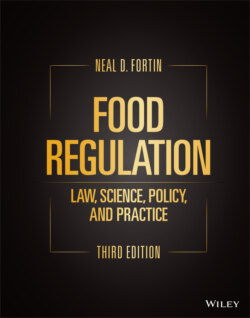Читать книгу Food Regulation - Neal D. Fortin - Страница 285
5.6.5 The FDA‐Accepted Qualified Health Claims
ОглавлениеExamples of some of the qualified health claims accepted by the FDA are as follows40:
Antioxidant Vitamins and Cancer
B Vitamins and Vascular Disease
Calcium and Hypertension, Pregnancy‐Induced Hypertension, and Preeclampsia
Calcium and Colon/Rectal Cancer and Calcium and Recurrent Colon/Rectal Polyps
Chromium Picolinate and Diabetes
Canola Oil Unsaturated Fatty Acids and Coronary Heart Disease
Corn Oil and Corn Oil‐Containing Products and Heart Disease
Cranberry Juice Beverages and Cranberry Dietary Supplements and Reduced Risk of Recurrent Urinary Tract Infection in Healthy Women
EHA and DHA and Reduction of Blood Pressure in the General Population
Folic Acid 0.8 mg and Neural Tube Birth Defects
Folic Acid, Vitamin B6, and Vitamin B12 and Vascular Disease
Green Tea and Cancer
Ground Peanuts and Reduced Risk of Developing Peanut Allergy
Nuts and Coronary Heart Disease
Olive Oil Monounsaturated Fatty Acids and Coronary Heart Disease
Oleic Acid and Coronary Heart Disease
Omega‐3 Fatty Acids and Coronary Heart Disease and Hypertension (eicosapentaenoic acid (EPA) and docosahexaenoic acid (DHA) omega‐3 fatty acids)
Phosphatidylserine and Cognitive Dysfunction and Dementia
Selenium and Cancer
Soybean Oil and Reduced Risk of Coronary Heart Disease
Tomatoes and/or Tomato Sauce and Prostate, Ovarian, Gastric, and Pancreatic Cancers
Walnuts and Coronary Heart Disease
Whole Grains and Diabetes Mellitus Type 2
Each accepted qualified health claim includes specific standards that a food must meet in addition to the general requirements for the claim. For example, a food with a heart claim may not exceed disqualifying levels of saturated fat and so forth. Some of the qualifications regarding the strength and weakness of the evidence are elaborate; for instance, the sample qualified claim below:
One study suggests that consuming tomatoes does not reduce the risk of pancreatic cancer, but one weaker, more limited study suggests that consuming tomatoes may reduce this risk. Based on these studies, FDA concludes that it is highly unlikely that tomatoes reduce the risk of pancreatic cancer.41
